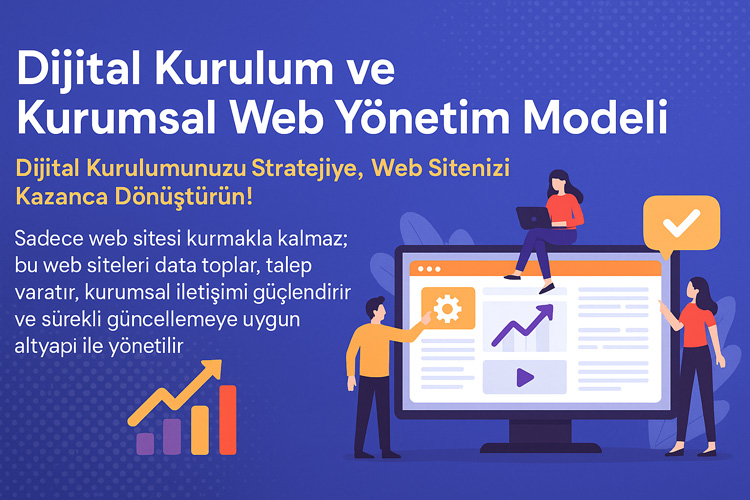We know that digitalization, which started a new era, is considered one of the greatest revolutions of our age. In this article, information about the digitalization process, digitalization strategies and sectoral transformations of digitalization will be given.
🔹 What is Digitalization?
Digitalization refers to the transformation of physical processes and data into computer-based processes and systems. Digitalizers use a variety of technologies and methodologies to speed up this process and make it more efficient.

🔹 Digitalization Process
Digitalization process is an organization’s transition to digital technologies. This process consists of a series of steps such as updating the technological infrastructure, learning to use digital tools, and developing digital activities. A good digitalization strategy helps manage this process and facilitates transformation.
🔹 What is Digital Management?
Digital management, ie e-governance, means integrating digital technologies into management processes. Digital management provides citizens with easier access to government services and also helps the government run its business more efficiently and transparently.
Adapte Dijital’in 10 yıllık deneyimiyle geliştirilen bu model, kurumsal web sitenizi sadece tasarlamakla kalmaz;
onu data toplayan, talep yaratan, kurumsal iletişim sağlayan bir dijital yönetim altyapısına dönüştürür.
Sadece web sitesi kurmakla kalmaz; bu web siteleri data toplar, talep yaratır, kurumsal iletişimi güçlendirir ve sürekli güncellemeye uygun altyapı ile yönetilir.
🔹 What is Digital Transformation?
Digital transformation refers to the improvement of an organization’s business processes, culture and customer experience with digital technologies. Digitizing is an essential part of a business’s digital transformation.
🔹 What is Digital Innovation?
Digital innovation is the process of creating new or improved products, services or business processes using technology. Digital innovation is an important part of digitalization and digital transformation processes. Digitization is used to speed up these processes and make them more efficient.
🔹 Impact of Digitalization on Sector Transformation
Digitalization is a transformation process that affects various sectors. Here are some examples of digitization:
- Health: Digital health technologies are making healthcare more effective and accessible. Digitization speeds up the processes of collecting and analyzing health information.
- Education: Digital education platforms renew learning processes and give students more flexibility.
- Retail: E-commerce platforms and digital payment systems transform the shopping experience and provide greater convenience to customers.
- Manufacturing: Digitized production processes increase efficiency and improve product quality.
- Finance: Fintech solutions help digitize financial services and provide faster and easier access to services.
🔹 Digital Agencies and Digitization
Digital agencies facilitate the transition of businesses to the digitalization process. These agencies help businesses create digitalization strategies and manage digital transformation projects.
Adapte Dijital’in 10 yıllık deneyimiyle geliştirilen bu model, kurumsal web sitenizi kurumunuzu/markanızı anlatan, tanıtan, güven yaratan, talep oluşturan bir dijital yönetim platformuna dönüştürür.
Adapte Dijital, bu modelde bir konumlandırma ajansı olarak çalışır. Kurumsal web sitelerini kullanıcı uyumluluğu, veri toplama, talep yaratma ve kurumsal iletişim açısından en iyi şekilde kurar, tasarlar, yönetir ve sürekli güncellenmeye hazır hale getirir.
As a result, digitalization provides serious transformations in various industries. This transformation process is not limited to just installing and using technology, but also includes innovating business processes, customer experiences and business models. Digitalizers are those who, as leaders of digital transformation, innovate and shape the digitalized world. Therefore, every sector should take the digitalization process seriously and play an active role in this transformation.
İçindekiler
ToggleWhat are the areas affected by digitalization?
Digitalization continues to transform every sector and almost every area of life. In this article, we will focus on the benefits and harms of digitalization, corporate memory and data collection, and discuss which areas digitalization affects.
🔹 Benefits of Digitization
It is very popular that digitalization provides an increase in productivity by automating business processes. By improving their ability to collect and analyze data, businesses can make more informed and data-driven decisions. This lowers the operational costs of businesses and helps them become more competitive.
Another advantage of digitalization is that artificial intelligence (AI) and other advanced technologies can be used. Artificial intelligence enables businesses to make faster and more accurate forecasts, leading to more efficient decision-making processes and ultimately higher profit margins.
🔹 Harms of Digitization
However, with the digitalization process comes various challenges and risks. These include data security and privacy issues, the cost of investments in technological infrastructure, and the need to develop employees’ digital skills.
🔹 Institutional Memory and Data Collection
Digitalization increases the importance of institutional memory and data collection. Institutional memory helps an organization improve its knowledge management. Good information management speeds up the decision-making processes and makes them more effective.
Data collection, on the other hand, helps a business understand market trends, customer preferences, and other important information. This improves businesses’ strategic planning and forecasting capabilities.
🔹 Areas Affected by Digitization
Digitalization affects a range of industries and functions. Here are some examples:
Auditing: Digital technologies automate auditing processes and provide faster and more accurate results.
Consulting: Digitization brings consultancy services to online platforms and provides broader access to consulting services.
Accounting: Cloud-based accounting systems make accounting processes faster and more efficient.
Finance: Digitization accelerates financial transactions and provides broader access to Agencies
Digitalization 🔹
Digital agencies facilitate the transition of businesses to the digitalization process. These agencies help businesses create digitalization strategies and manage digital transformation projects.
In conclusion, what is digitalization and it is a transformation that reshapes business processes and increases productivity. However, it is important to manage this transformation process effectively and to consider the possible risks of digital technologies. Therefore, the digitalization process is not only limited to installing and using technology, but also requires strategic thinking and redesigning business processes.
Digitalization in the Retail Industry
We want you to know that digitalization has had a breakthrough effect on the retail industry, making it better and more manageable. Transactions in this industry have been digitized fastest, resulting in a fluent shopping experience for consumers. It also helped retailers manage their business processes the most cost-effectively.
With digital technologies such as e-commerce, social media marketing, data analytics and artificial intelligence, retailers can better understand consumers’ behavior and preferences and serve them best. This increases customer satisfaction and strengthens brand loyalty.
Digitalization also offers retailers and consumers the opportunity to open the doors of a whole new era. New digital trends such as virtual and augmented reality technologies offer consumers unique and interactive ways to experience products and services.
As a result, -what are/” rel=”noreferrer noopener”>what does digitalization do, it makes the retail industry more innovative, more competitive and more customer-focused. This enables the industry to thrive in the ever-evolving digital age.
Digitization in Financial Services
Digitalization is causing a dramatic transformation in the financial services industry. By applying digitalization theories and digitalization methodology, the industry makes business processes and customer interactions more efficient and effective in digital format.
The impact of digitalization on business life is indisputable. It has created sources of innovation in many areas such as financial services, automated transaction processes, data analytics, and customized customer service. In addition, cloud computing technologies enable financial institutions to scale their infrastructure and services and make their business processes more efficient.
Digitalization also affects the financial services industry’s attract and retain strategies. Digital capabilities are critical for financial institutions to achieve their digital transformation goals.
Digital agencies also play an important role in the financial services industry. These agencies assist financial institutions in creating digital transformation strategies and using digital technologies effectively.
As a result, digitization is making the financial services industry faster, more efficient and more customer-centric. This enables the industry to compete in the ever-changing and evolving digital age.
Digitization in Production
Digitalization in the manufacturing sector allows businesses to achieve high profitability by maximizing production speed by transferring processes and processes to digital environment. Digital technologies make it possible for businesses to optimize their production processes, reduce costs and thus be more profitable.
Digital agencies play an important role in digitizing production processes and achieving the digital transformation goals of businesses. These agencies provide expertise in digitizing production processes, using data analytics and digital technologies effectively.
Digitalization in manufacturing also increases businesses’ ability to use information from various data points. This enhances businesses’ ability to plan their performance, evaluate performance and develop strategies for continuous improvement. Therefore, digitization has become a critical tool for effective performance management.
As a result, digitalization in manufacturing helps businesses gain profitability, efficiency and competitive advantage. This enables the manufacturing industry to succeed in the digital age.
Digitalization in energy
In the energy sector, digitalization has become an important resource to increase efficiency, reduce costs and promote sustainability. digitalization of all processes, from power generation to distribution, enables energy companies to have a more effective e-governance system.
Digital technologies, such as smart grids and data analytics, are enabling the radical digitalization of the energy sector, thereby increasing operational efficiency. Digitizing technologies make energy generation and distribution processes more predictable and manageable.
In addition, in the new world created by digitalization called digitopia, it will be possible to see how the energy sector evolves with digital technologies and how it meets customer expectations.
Digital agencies assist energy companies in developing digitalization strategies and integrating digital technologies. In this way, energy companies can maximize the opportunities brought by digital transformation.
The result is that In addition, digitalization in energy is critical to increase the efficiency of the sector, reduce costs and create a sustainable energy future.
Digitization in the healthcare industry
Digitalization in the healthcare industry offers the potential to provide more effective patient care, improve business processes and increase the accessibility of healthcare services. Many organizations in the industry are investing in technologies that digitize their processes.
A wide range of technologies, from telemedicine to artificial intelligence and big data analytics applications, are helping to digitize the industry comprehensively. These technologies make the delivery of healthcare services more efficient and patient-focused, while providing healthcare professionals with more information and resources.
The implementation of e-governance models in the industry is also an important part of digitalization. Digitizing healthcare management makes the management of patient data and healthcare more efficient.
Digital agencies also play a role in this area. They help healthcare organizations create their digital transformation strategies and use digital technologies effectively.
As a result, digitalization in the healthcare industry enables patients to receive better care, manage healthcare services more effectively, and expand healthcare accessibility. This means that the digitalizing healthcare industry is delivering huge benefits for both patients and healthcare providers.
Digitalization in the manufacturing industry
Digitalization in the manufacturing industry offers the potential to increase production speed, optimize business processes and reduce costs. Many organizations in this industry are investing in technologies that digitize their processes and services.
This transformation, also known as Industry 4.0, involves the use of smart factories and devices that can connect and share data over the internet (IoT). This can completely transform manufacturing processes and enable organizations to get their work done faster and more efficiently.
Digital agencies can play an important role in this process, as they assist manufacturers in the selection, implementation and management of digital technologies. These agencies make it easier for companies to achieve their digital transformation goals.
The e-governance practices in the industry are also an important part of digitization. Digitizing manufacturing processes and data increases the efficiency of companies and makes business processes more efficient.
In conclusion, digitalization in the manufacturing industry is a transformation process with significant effects on speed, efficiency and quality. When manufacturers correctly capitalize on these opportunities, they can both gain a competitive advantage and significantly improve customer service.
Other Industries
There are many sectors that digitalization affects and transforms. Here are some of these sectors:
-
- 📚 Education Industry: Distance learning, learning management systems, and AI-based personalized learning solutions are transforming the education industry.
-
- 🛍️ Retail Industry: E-commerce, mobile applications and payment systems play an important role in the digitalization of the retail industry.
-
- 🚖 Transport and Logistics Sector: Telematics systems, artificial intelligence and automation are accelerating the digital transformation of the transport and logistics industry.
-
- 🚑 Health Industry: Telemedicin, electronic health records and smart wearable technologies are helping the healthcare industry become more patient-focused and effective.
-
- 💼 HR and Recruitment Industry: Digital recruitment platforms, cloud-based HR software and employee experience have evolved Digital tools are transforming the HR and recruitment industries.
-
- 🎬 Media and Entertainment Industry: Online streaming platforms, social media and mobile applications are shaping the digital transformation of the media and entertainment industry.
-
- 🏦 Finance Industry: Mobile banking, digital payments and blockchain technology are accelerating the digitalization of the financial services industry.
In each industry, digitization offers the potential to create more efficient services, better customer experiences, and generally more efficient and cost-effective operations. How to digitalize

Digitization in agriculture
In agriculture digitalization includes technologies that increase productivity, optimize business processes and promote environmental sustainability. This can include a range of technologies, from precision farming applications to artificial intelligence and big data analytics, IoT devices and drones.
Many farms and agribusinesses are investing in technologies that digitize their operations. These technologies collect, analyze and transform farm data into information, enabling farmers to make more informed decisions and manage their businesses more effectively.
digital agencies can play an important role in this transformation process, as they assist agribusinesses in the selection, implementation and management of digital technologies.
The application of e-governance models in agriculture is also an important part of digitization. Digitizing farm data and business processes can increase efficiency and make business processes more efficient.
As a result, digitalization in agriculture can enable the agricultural sector to make significant advances in productivity, sustainability and profitability. This means that the digitized agricultural sector brings huge benefits for both farmers and consumers.
You can also read our article on digital applications: Implementation of digital consulting
Digitization in tourism
In the tourism industry, digitalization means improving services, improving customer experience and optimizing business processes. Digitalization helps travel agencies, hotel chains and tour operators speed up their operations and become more efficient.
Many businesses in the industry are investing in digital technologies to improve customer service and streamline business processes. Online reservation systems, virtual tours, AI-based recommendation engines, and social media marketing strategies are examples of digitalizing technologies in this industry.
In the tourism sector digital agencies can play an important role. These agencies can assist travel and tourism companies in the selection, implementation and management of digital technologies.
E-governance in the tourism sector is also an important part of digitalization. Reservations, customer feedback and digitizing business processes make companies’ operations more efficient and improve customer service.
As a result, digitalization in tourism makes the travel and accommodation experience more comfortable, efficient and enjoyable. d for travelers A digitizing industry means more choice, better services and an overall better experience.
Digitization in logistics
Digitalization in the logistics industry is the trend of using technological solutions to increase efficiency, automate processes, reduce costs and increase supply chain visibility. Logistics companies are pioneers that digitize their services using technologies such as AI, big data, cloud computing and blockchain.
In logistics, digitization is used to increase efficiency in transportation and streamline operations. This can have an impact on a range of processes, from inventory management to supply chain optimization, from fleet management to route planning.
Also, e-governance in logistics is an important part of digitization. This means automating and digitizing logistics processes, making business processes more efficient and more manageable.
The logistics industry can accelerate this digital transformation by collaborating with digital agencies and technology providers. Digital agencies can assist logistics companies in the selection, implementation and management of digital technologies.
As a result, digitalization in logistics can make transportation and supply chain management processes more efficient, faster and cost-effective. This provides great benefits for both logistics companies and their customers. Digitalization in logistics will shape not only the current business processes of the industry, but also future business models and strategies. You can learn the features of digitalization from our article
Result
Based on our latest analysis, digitalization is driving fundamental changes in almost every industry. Retail from the industry financial services , production and Energy sectors, health , agriculture , tourism and Logistics areas up to the fields of technology and the Internet and the fastest of the industry and the fastest of the industry and the fastest of the sectors. It allows him to serve em> service.
You can earn a lot of information from Youtube by watching Digital Youtube channel.
Digitization and digitalization in industries involves a radical transformation of business models, business processes and services. New technologies and digitalizing business models increase efficiency, improve service quality and make business processes more manageable.
Digital agencies have an important role in this transformation process. They can assist businesses in the selection, implementation and management of digital technologies. They also play an important role in increasing the impact of e-governance and information technologies on businesses and facilitating the digitization process.
As a result, digitization and digitalization have the potential to increase the performance, efficiency and sustainability of industries. This enables businesses and consumers to enter a new era of . However, the success of digitalization depends on the ability to keep up with technological changes and to manage these changes effectively. This means that digitalizing agencies and other technology providers must support and guide this process.


















































